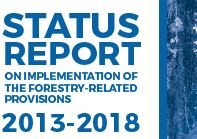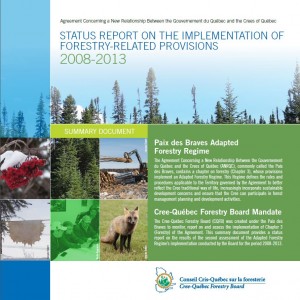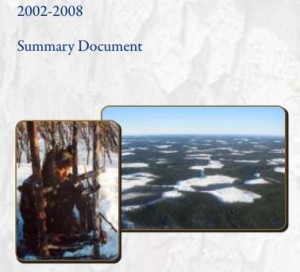Status Report on the Implementation of Forestry-Related Provisions
The Cree-Québec Forestry Board was created to monitor, report on and assess the implementation of Chapter 3 of the Agreement Concerning a New Relationship Between the Gouvernement du Québec and the Crees of Québec.
In keeping with its mandate, the Board has, so far, published three reports on the implementation of the forestry-related provisions:
- In 2009, the status report on the first six years of the implementation of the Agreement’s forestry-related provisions from its signing on February 7, 2002 to March 31, 2008.
- In 2015, the Board published its second Status Report, for the period of April 1st, 2008 to March 31, 2013.
- In 2020, the Board published its third Status Report, for the period of April 1st, 2013 to March 31, 2018
- In 2025, the Board published its forth Status Report, for the period of April 1st, 2018 to March 31, 2023.
2018-2023 Status Report
To ensure a certain degree of continuity with the two previous five-year status reports, the approach for carrying out the 2013-2018 status report is again based on two levels of analysis: (1) factual analysis of the implementation of all the Adapted Forestry Regime provisions (detailed analysis, section-by-section) and (2) analysis of the stakeholder interviews (tallymen, Joint Working Group (JWG) members and coordinators, Board members, technical advisors and forestry industry representatives) conducted to get a sample of their viewpoints on the achievement of Chapter 3’s objectives. The objectives of the AFR thus aim to allow:
- Greater consideration for the Cree traditional way of life
- Greater integration of concerns relating to sustainable development
- Participation, in the form of consultation, by the Crees in the various forest activity operations planning and management processes
- Collaboration, in the form of concerted action, by the Cree Nation Government (CNG) and the Eeyou Istchee James Bay Regional Government (EIJBRG) in the participation process for the planning provided for in Schedule C-4 of Chapter 3 of the Agreement
The 2018-2023 status report on implementation of the Paix des Braves’ AFR is positive overall, challenges and issues remain and necessitate maintaining an ongoing approach aimed at continuous improvement. In terms of general recommendations, the Board proposes to:
- Ensure the completion of the file on wildlife habitat management guidelines currently under development;
- Strengthen communication and collaboration among the AFR implementation mechanisms;
- Continue the monitoring, analysis, and knowledge‑acquisition projects initiated by the implementation mechanisms;
- Continue the implementation of the economic component of the AFR.
2013-2018 Status Report
2008-2013 Status Report
2002-2008 Status Report
Ongoing monitoring
The Board adopted a monitoring framework to assess the implementation of Chapter 3 of the Agreement on an ongoing basis. This dynamic, interactive tool addresses the issues and needs for AFR evolution when they arise. Therefore, courses of action can be proposed without waiting for the end of the five-year period and production of the next status report.



